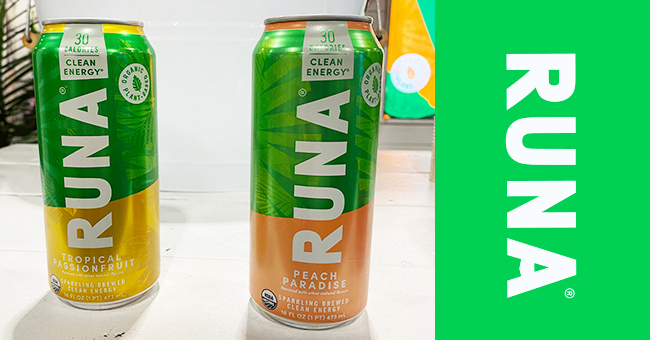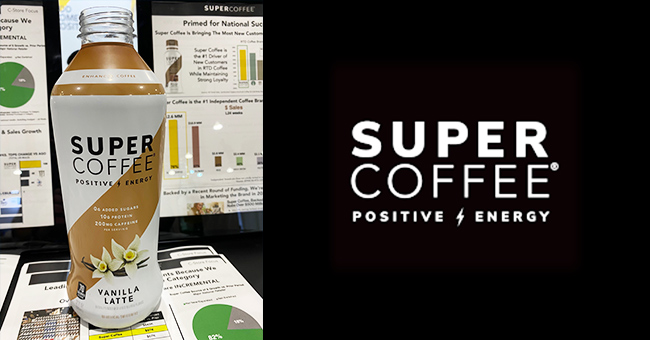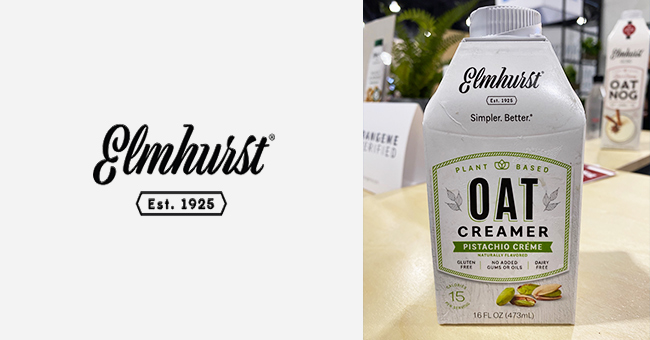Vita Coco Evolves Energy, Revamps Runa
However you may feel about coconut water, you can’t accuse Vita Coco of just coasting on its laurels. Riding a renewed wave of interest in the category, the company continues to recalibrate and reconfigure its product portfolio to meet consumer needs while nudging them towards different use occasions.
Case-in-point: at Natural Products Expo East this week, Vita Coco showcased a new simplified identity for its Boosted line, which debuted in January. Repositioned as Vita Coco Energy, the idea is to give consumers a clearer callout and “eliminate any confusion” as to what to expect from the B-vitamins and MCT oil-powered line. The front panel drops the badge calling out “sustained energy for body and mind,” though general color scheme and 16.9 oz. TetraPak packaging remains the same. The flavors and formulas themselves will remain unchanged when the revamped line hits stores next year, with the exception of a Chai SKU getting swapped out for a more neutral “Coconut” to play alongside Coconut Chocolate and Vanilla. A sell sheet cited data pointing towards energy as the third highest health priority amongst consumers, but reps at the show affirmed that the product will play alongside current coconut water offerings rather than Red Bulls and Monsters. The line features a mild caffeine dose (40 mg), zero sugar, 130 calories per container and carries a suggested retail price of $3.29.
Vita Coco’s non-dairy coconut milk is also getting a makeover, along with the addition of new Vanilla and Cinnamon flavors. The line brings “milk” back to the forefront (downplaying “non-dairy beverage” text on the current design), giving the brand an opportunity to “export” interest in the category from the grab-and-go cooler to other parts of the store. Often used as a smoothie base or in culinary applications, the revamped milks are designed to broaden Vita Coco’s category leadership in terms of use occasions but also channels, as the products will be launching at Walmart on November 1.
Though it has struggled at times to find its place since joining Vita Coco’s portfolio in 2018, the company is still tweaking its guayusa-powered natural energy drink, Runa. The current lineup, in 8.4 oz slim cans, was reformulated in March 2020 to reduce calories and create a more mainstream flavor profile, CEO Mike Kirban said at the time, but the company is going in the other direction as it targets a push into c-stores. That means a bigger 16 oz. can and new flavors that drop stevia in favor of monk fruit, again looking for that mainstream appeal: Wild Black Cherry, Tropical Passionfruit and Peach Paradise, all 30 calories and 150 mg of caffeine each. Slim cans will remain available on Amazon and in conventional grocery stores.
Through mostly incremental changes — the exception being protein water PWR LIFT, which will receive a proper debut at the National Association of Convenience Stores (NACS) trade show next month — Vita Coco’s growth strategy is “honing in on trends” and delivering flavor through the growing portfolio, which also includes Organic (exclusive to Whole Foods), Pressed and Sparkling coconut waters, the latter of which is being reintroduced as function-forward “Super Sparkling” in limited release.
Super Coffee Shoots for Morning Glory, Builds Behind Bottles
After making an all-out blitz for the entire coffee space, Super Coffee is turning back to flavor innovation this fall. Along with its flagship RTD line in bottles and cans, the brand now offers packaged coffee, concentrate, K-Cups and creamers, but the focus at Expo East was on a trio of new breakfast-themed additions that will become part of the permanent lineup early next year.
The inspiration to push forward with “tasty pastry” breakfast flavors — Blueberry Muffin, Cinnamon Roll and Caramel Waffle, all clocking in at 80 calories each — came from the enthusiastic response to its first summer seasonal release from this year, Blueberry Latte. Available in single-serve 12 oz. bottles, the new flavors are part of the brand’s evolution towards plant-based protein sources (10g per bottle) while maintaining the same position as zero-sugar, high-caffeine (200mg) alternative to Frappuccino-style indulgent coffees.
However, those flavors won’t be available in 11 oz. aluminum cans: citing procurement and supply chain challenges, that line will be migrating back to 12 oz bottles over the coming months as remaining inventory is shipped out. Same goes for its 32 oz. glass multi-serve bottles, also now moving to PET. Elsewhere, Toasted Hazelnut is replacing the plain Hazelnut variety in the creamers line.
Elmhurst Pivots to Pistachio
Through the use of its specialized “hydro-release” production process, alt-dairy milk brand Elmhurst has been one of the category’s most enthusiastic innovators, releasing products featuring almonds, hazelnuts, walnuts, hemp seed, oats, peanuts, macadamia nuts and pecans. Where else to go? Pistachios, apparently.
At Expo East, the brand was pouring samples of its first pistachio-based product, a barista edition milk packaged in its signature 32 oz. SIG Combidome carton. Though an expensive and relatively niche proposition (Three Trees and newcomer Tache also play in the space), the distinct flavor offers something truly differentiated from a category dominated by oat and almond milks.
The company also showcased a limited edition “oat nog,” its plant-based take on the holiday favorite. Available in a single SKU, the nog blends oat milk with cashews, cinnamon and spices and is available in 32 oz. multi-serve cartons.
Meanwhile, Elmhurst is also revamping its two-SKU line of shelf-stable oat lattes which debuted at Expo East 2019. Originally presented in 11 oz. TetraPaks, the products are now in wrapped 12 oz. bottles (similar to OWYN or Super Coffee), while initial flavors — coffee based Espresso and Cacao, plus tea-based Golden Milk — have been pared down to a simple “flash-brew” coffee and matcha.



